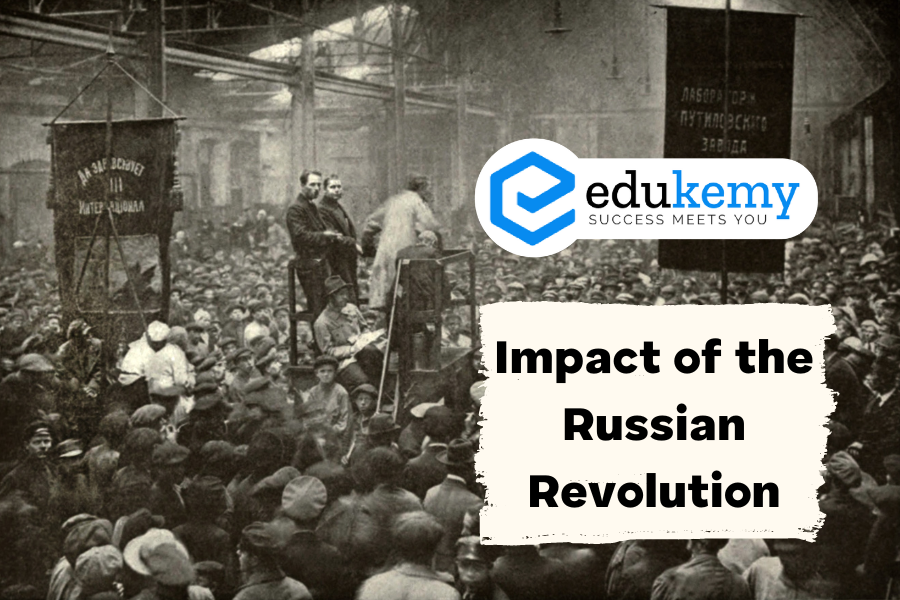
The impact of the Russian Revolution of November 7, 1917, was profound and far-reaching, both globally and within India:
- Inspiration for Anti-Colonial Movements:
- The success of the Bolshevik Party in overthrowing the Czarist regime and establishing the Soviet Union inspired anti-colonial movements around the world, including in India.
- The idea that ordinary people could challenge and overthrow oppressive regimes resonated with nationalist leaders and movements in India who were fighting against British colonial rule.
- Ideological Influence:
- The Russian Revolution introduced socialist ideology and the concept of class struggle to India.
- Indian nationalists, particularly those on the left, were inspired by the Bolsheviks’ vision of a classless society and their methods of organizing workers and peasants.
- Impact on Indian Nationalism:
- The revolution heightened nationalist sentiments in India and added momentum to the struggle for independence.
- It emphasized the power of mass mobilization and collective action, which influenced tactics and strategies adopted by Indian nationalist leaders and organizations.
- Solidarity with Soviet Union:
- The Soviet Union’s support for anti-imperialist struggles and its promotion of self-determination for colonized peoples resonated with Indian nationalists.
- Indian leaders saw the Soviet Union as an ally in the fight against British imperialism and as a model for a post-colonial society.
- Fear and Repression from British Authorities:
- The British colonial authorities viewed the spread of socialist and communist ideas with alarm and responded with increased repression of leftist movements and leaders in India.
- The fear of a Bolshevik-style revolution in India led to crackdowns on socialist and communist organizations and activists.
Overall, the Russian Revolution had a profound impact on the course of Indian nationalism, shaping ideologies, strategies, and alliances in the struggle for independence from British colonial rule.
Contents
- 1 FAQs
- 1.1 Q: What was the Russian Revolution and when did it occur?
- 1.2 Q: What were the main causes of the Russian Revolution?
- 1.3 Q: What were the immediate consequences of the Russian Revolution?
- 1.4 Q: How did the Russian Revolution impact the world?
- 1.5 Q: What long-term effects did the Russian Revolution have on Russia itself?
- 2 In case you still have your doubts, contact us on 9811333901.
FAQs
Q: What was the Russian Revolution and when did it occur?
A: The Russian Revolution refers to a series of revolutions in Russia in 1917, which led to the overthrow of the Tsarist autocracy and the eventual rise of the Soviet Union. The main revolutions took place in February and October 1917.
Q: What were the main causes of the Russian Revolution?
A: The Russian Revolution was primarily fueled by socio-economic discontent among the working class, exacerbated by the hardships of World War I, widespread poverty, and inequality under the Tsarist regime. Additionally, the autocratic rule of Tsar Nicholas II and his failure to address the demands of the people contributed significantly to the unrest.
Q: What were the immediate consequences of the Russian Revolution?
A: The immediate consequences of the Russian Revolution included the abdication of Tsar Nicholas II, the establishment of a provisional government, and the rise of the Bolsheviks led by Vladimir Lenin. It also led to a civil war between the Bolsheviks (Reds) and their opponents (Whites), resulting in immense suffering and loss of life.
Q: How did the Russian Revolution impact the world?
A: The Russian Revolution had profound global repercussions, inspiring revolutionary movements and leftist ideologies worldwide. It led to the establishment of the first communist state, the Soviet Union, which became a major geopolitical player during the 20th century. The revolution also intensified ideological tensions between communism and capitalism, shaping international relations for decades to come.
Q: What long-term effects did the Russian Revolution have on Russia itself?
A: The Russian Revolution fundamentally transformed Russian society and politics. It brought an end to centuries of autocratic rule and laid the groundwork for a new socialist state. The Soviet regime implemented sweeping social, economic, and political reforms, including the collectivization of agriculture, industrialization, and the suppression of dissent. The revolution also left a legacy of authoritarianism, censorship, and political repression that persisted throughout much of the Soviet era.
In case you still have your doubts, contact us on 9811333901.
For UPSC Prelims Resources, Click here
For Daily Updates and Study Material:
Join our Telegram Channel – Edukemy for IAS
- 1. Learn through Videos – here
- 2. Be Exam Ready by Practicing Daily MCQs – here
- 3. Daily Newsletter – Get all your Current Affairs Covered – here
- 4. Mains Answer Writing Practice – here

